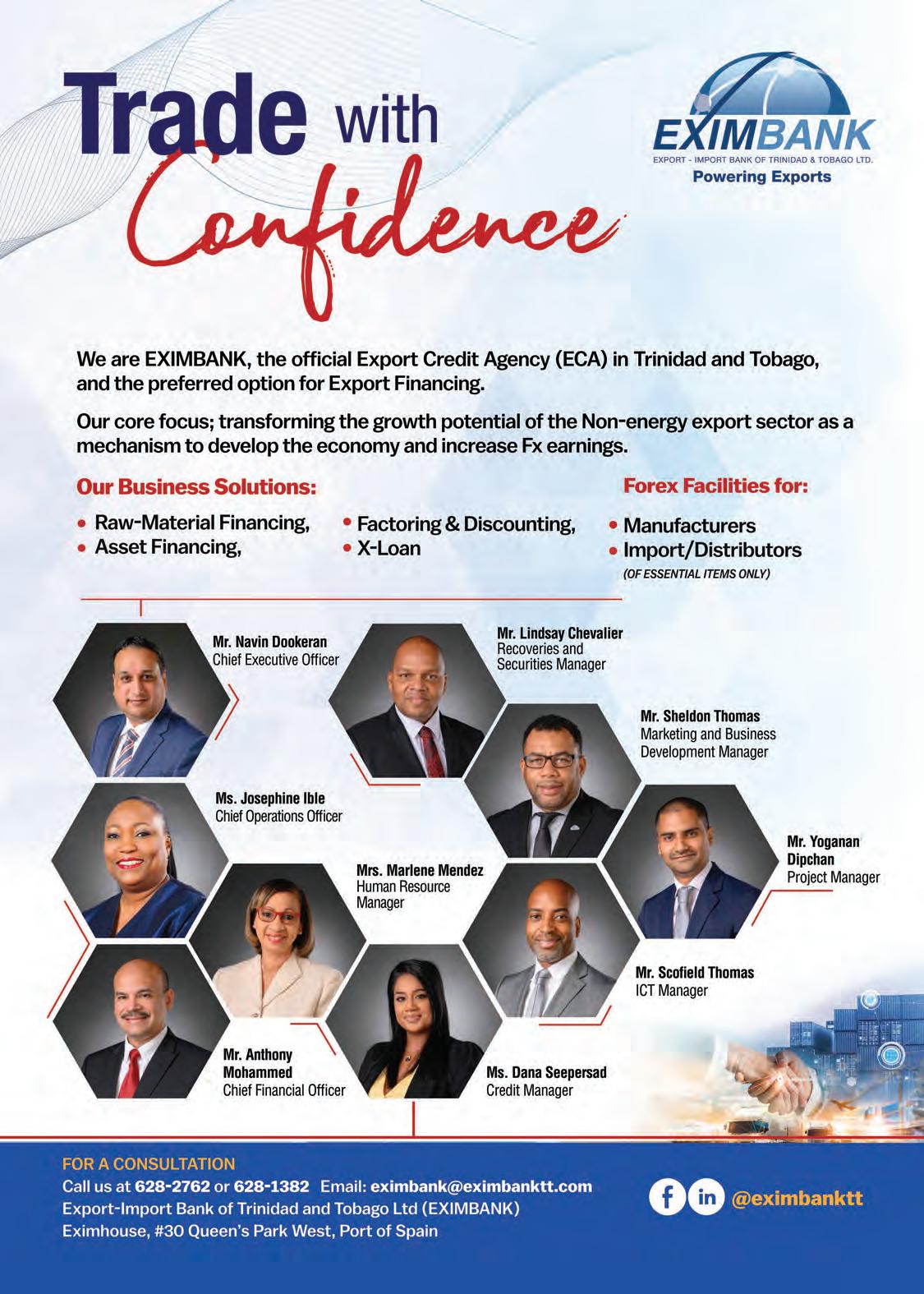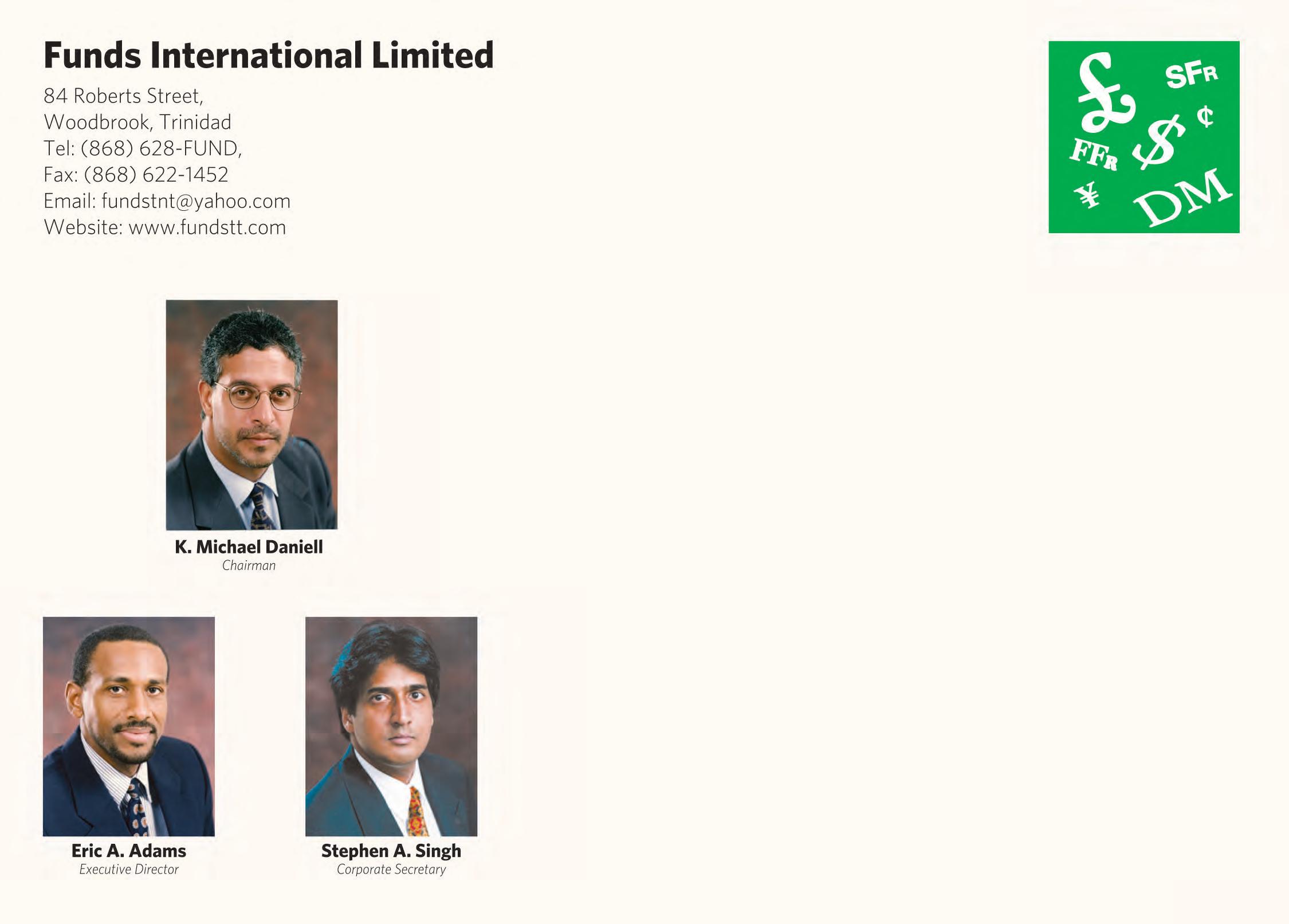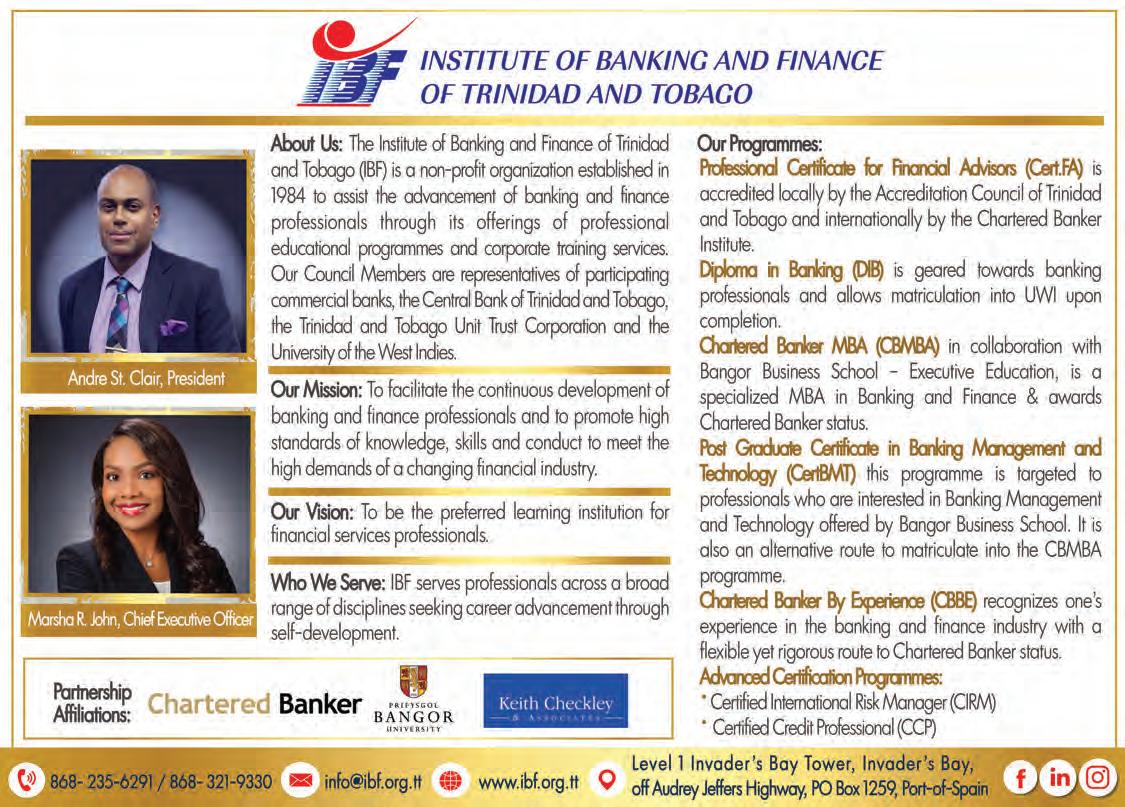
13 minute read
BANKING, INVESTMENT AND FINANCIAL SERVICES
Helping SMEs Succeed
By Kay Baldeosingh-Arjune
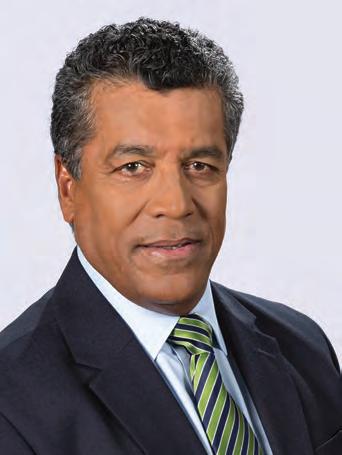
INTERVIEW
Ian De Souza
Principal Adviser, Advice Financial Company Ltd.
Veteran career banker, financial consultant and former Chamber CEO Ian De Souza has a rich perspective to share on the challenges and achievements the financial sector faced in 2021, the path forward in 2023, and the support needed by SMEs which would redound to the continued growth of the overall financial system and the larger economy.
Challenges
The major challenges in 2021 and the first half of 2022, he said, all related to the recovery of businesses, and small and medium-sized enterprises (SMEs) in particular, from the impact of the pandemic and, more recently, the Russia-Ukraine War. These challenges, he noted, included:
• Supply chain issues, including the cost of shipping, which affected the supply of goods and services • The increase in energy and food prices, which have also affected consumer and raw material prices • The challenges of small and mediumsized businesses in servicing debts with loan moratoria extended by banks due to economic activity not having returned to normal.
Developments and milestones
Despite these challenges, he saw a number of positive developments taking place. These included: • Increased use of digital solutions in conducting business • Use of internet banking • The establishment of a separate
Ministry of Digital Transformation which, he said, signals Government’s intent on transforming how services are delivered to the public. He flagged two business developments as significant milestones that would positively impact the business and hence the financial sector. They were:
• The opening of the Phoenix
Park Industrial Estate, which is a significant means of support for business and trade, for example, the PriceSmart regional distribution hub which is being set up on the new estate. • The Trinidad & Tobago Trade and Business Information Portal (TTBizLink) set up by the Ministry of Trade & Industry and launched in May 2022. Explaining the significance, De Souza said the facility gives all of the information required by an exporter to this country or someone looking to do business locally, as well as all of the information needed by a national exporter or importer seeking to find markets for manufactured products or source goods and raw materials.
Moving forward
How does the industry move forward to better meet the needs of the business sector in 2023 and beyond? The veteran banker emphasised: “The fact that the banks are very conservative in their lending and investment policies is a positive. There will always be pressure on the banks to be less conservative in their lending policies, but one has to be mindful of the fact that there are two sides to a bank’s balance sheet, and the interest and safety of depositors always have to be borne in mind. Conservatism helps protect depositors and national savings.”
Concerning the needs of SMEs, he said: “There is pressure from small and medium-sized businesses for more financing support. The challenges they face in accessing loan capital is a limited amount of capital of their own for equity injection, and they also generally have limited amounts of security to offer. It is to be noted that most major financial institutions have special programmes to support SMEs, so that need is not lost on the industry. However, the challenge for banks and other financial institutions is that the failure rate for SMEs is high and to ensure that loan losses are minimised, there has to be insistence on equity injections and/or security.”
But he pointed out that apart from equity and security requirements to access funding, SMEs also need support in the following areas:• Affordable advisory support and representation in the interface with financial institutions when difficulties are encountered in servicing debts and reorganisation/ restructuring is necessary • Access to shared professional services when financial circumstances do not support the employment of individual professionals • Documenting bankable proposals for expansion when new projects are being considered • Accessing grant and funding support from multilateral agencies that have facilities specifically geared to support the SME sector • Accessing the Junior Stock
Exchange which has a window that is specifically geared to support those who have the capacity to scale up and can attract equity capital as an alternative to traditional bank financing.
Projected outlook
Looking forward to 2023, De Souza said: “The banking and financial services sector will continue to be challenged by the impact of rising prices and the cost of living on their personal loans customers,” which reduces disposable income(s) and spending ability, and affects business revenue and the ability to cover previously contracted costs and debts. However, he assured: “The sector is strong, thanks to the conservatism in lending and investment policies, so the major institutions have enough ‘wool on their backs’ to weather the storm.”
(Ian De Souza has spent 40 years in the banking sector, holding senior executive positions. He is now the Principal Adviser in a company he established – Advice Financial Company Ltd.)

INTERVIEW
Navin Dookeran
Chief Executive Officer, Export-Import Bank of Trinidad & Tobago Ltd. (EXIMBANK)
Boost Exports and Forex
By Kay Baldeosingh-Arjune
In 2023, EXIMBANK CEO Navin Dookeran wants to see exporters exporting more… and importers becoming exporters. That is the economic vaccine the country needs, he told ‘Who’s Who’. The foreign exchange supply issue, while slightly improved from 2020, has not been resolved. For Dookeran, the solution is straightforward – increase Forex earnings.
The EXIMBANK is ready to partner with the commercial banking sector to support T&T’s exporters in their drive to penetrate more markets in 2023. The organisation is particularly interested in helping small and medium-sized enterprises (SMEs) grow because “they are key to T&T’s long-term national economic growth,” Dookeran said.
The supply chain disruptions currently impacting global trade have created a great opportunity for T&T as nearshoring is deployed as a strategy to address those disruptions, he said, but to take advantage of this, manufacturers need to focus on improving productivity and competitiveness by:
• investing in planned machinery upgrades; • adoption and deployment of technology; and • having a reinvigorated focus on global marketing.
It is also an opportunity for importers to consider exporting to solve the tight foreign exchange situation. “Our importers have very good, long-term supplier relationships and they buy in volumes that allow them good prices,” he noted.
Another advantage available is T&T’s well-capitalised banking sector and available liquidity to provide the capital funds for investment at a reasonable cost. The constraint is not on the liquidity side, Dookeran added. What is tricky is finding the right comfortable risk appetite that would allow the banks to invest in the SME sector. The EXIMBANK can play a role here, he said. “There is room for further risk-sharing strategies that would allow the banks to mitigate their risks while enabling increased private sector investment in SMEs, for example, via collateral backing programmes,” he said.
Financial literacy programmes are also needed to help SMEs develop their financial readiness and have proper financial statements and record-keeping, without which the banks cannot do any risk analysis and credit analysis, Dookeran said.
Looking at how the banking and financial sector will change and progress, Dookeran said that digital banking was a global megatrend and fintechs were an opportunity for T&T banks to broaden both their reach and their offerings. “Many developed markets as well as some developing markets in Africa have already moved towards having the majority of their payments done via electronic means.” However, T&T is still a very cash-based economy. The priority is to move to electronic payments in the public sector, he said. He also suggested that the banking sector could push and drive consumer behaviour towards cashless. Pointing out that banks were currently using the electronic payments infrastructure set up by the Central Bank, Dookeran also suggested increasing the availability of these electronic fund transfer services to the micro and small business sector. Digital banking is an area of opportunity, but banks have to convince people of its value, he concluded.




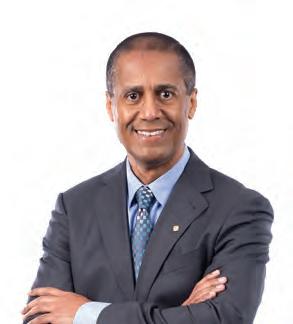





































By Kay Baldeosingh-Arjune
INTERVIEW
From a Central Bank perspective, could you give a brief overview of the sector in 2021 and to date, highlighting any challenges and key developments as we move forward?
Dr Alvin Hilaire
Governor, Trinidad and Central Bank of Tobago’s financial Trinidad and Tobago sector continued to demonstrate health and resilience in 2021, despite the challenges associated with the pandemic. Credit, market and liquidity risks were heightened in 2020 given the global health crisis, domestic infections, supply chain disruptions and lockdowns aimed at curbing the spread of the virus. Policy actions – including strong fiscal support and monetary actions to boost liquidity – helped to restrain the macroeconomic fallout. At the same time, adjustments by financial institutions as well as forbearance measures by the Central Bank provided some breathing room for individuals and businesses in managing their debt commitments. As a result, overall the banking sector continued to be well-capitalised, profitable and with adequate liquidity in 2020 to date.
How does the banking and financial services industry need to move forward?
Going forward, the banking and financial services industry should continue to embrace the use of financial technology
(fintech), while becoming more peoplecentred in their product and service delivery. The demonstrated benefits of modern technology and communications should be reflected in lower transaction costs of services to consumers and greater efficiency in product delivery. Meanwhile, financial institutions must be sensitive to the needs of customers who are not tech-savvy and must be prepared to significantly shore up their cyber defences to deter fraud and service interruptions.
More generally and consistent with what is happening worldwide, we anticipate that there will be new non-traditional players offering financial services in Trinidad and Tobago, notably fintech companies. The Central Bank is gearing up to deal with regulation in this unfamiliar area by partnering with other regulators, such as the Securities and Exchange Commission and Financial Intelligence Unit, as well as fintech industry representatives.
Relatedly, can Government and/or a private sector partnership contribute to the success of the industry? Is policy or legislation needed to move the industry along?
Yes, there is a need for continued collaboration among all parties – the Government, regulators, private companies, and the public – to ensure durable financial development in Trinidad and Tobago. As noted earlier, the new insurance legislation marks a significant step in buttressing insurance supervision. Likewise, other gaps will need to be identified and addressed as opportunities and issues unfold in the dynamic financial services industry. For example, the concept of legal tender itself is being reviewed to take into account digital means of payments. A proactive, forwardlooking approach, seeing the experiences of other countries is essential to assure that Trinidad and Tobago keeps pace with the ever-changing global financial landscape.
What is your projected outlook for the sector between 2022 and 2023 ?
The domestic financial sector has weathered the pandemic reasonably well. The outlook is positive as the pandemic subsides and economic activity worldwide accelerates. Some of the new challenges include inflation sparked by supply shortages, defensive actions by major central banks that lead to higher interest rates which could dampen growth prospects, and geopolitical turmoil. We expect the domestic financial sector to remain resilient to these challenges. There is likely to be some more consolidation of financial firms, with new mergers and acquisitions within the country and with regional counterparts. An essential component of such success is the capacity of the supervisors to maintain a stable atmosphere and at the Central Bank, we are doing our part to prepare.
The Central Bank of Trinidad and Tobago is widely respected as a monetary policy authority and guardian of financial stability grounded in international best practices. The Bank conducts monetary policy and supervises and regulates licensed financial institutions in Trinidad and Tobago. The institution is committed to public education about core economic and financial concepts, as well as increasing awareness of its roles and functions. For specific queries, you may contact us via email at info@central-bank.org.tt. The Central Bank of Trinidad and Tobago Eric Williams Financial Complex Independence Square, Port of Spain Phone: (868) 621-CBTT (2288) Fax: 1 868 625 0021 Email: info@central-bank.org.tt Website: https://www.central-bank.org.tt
